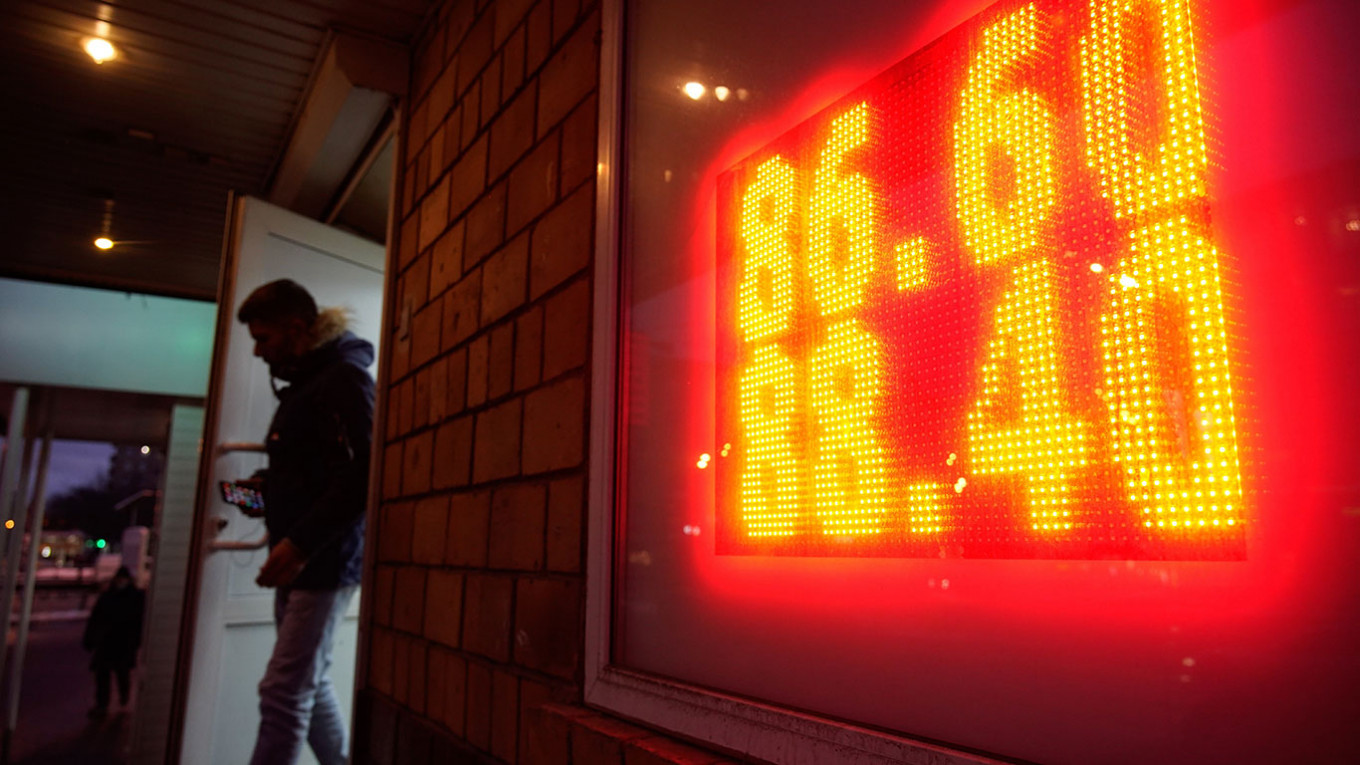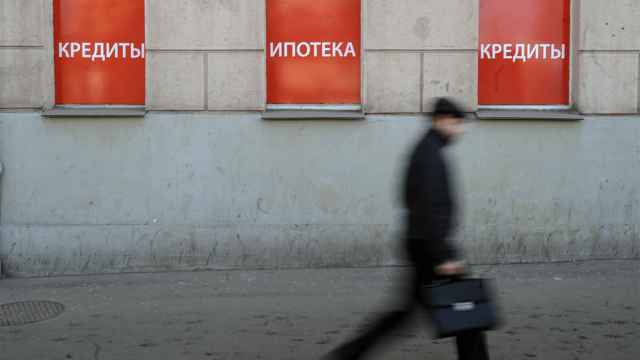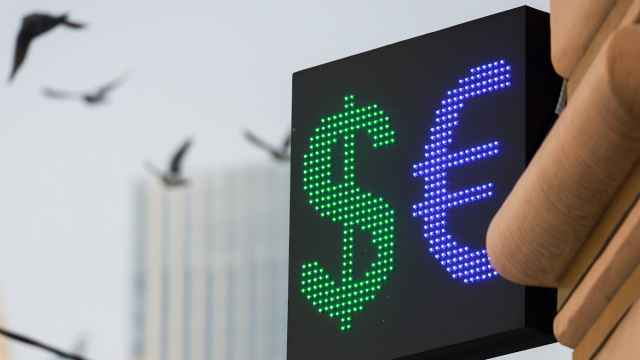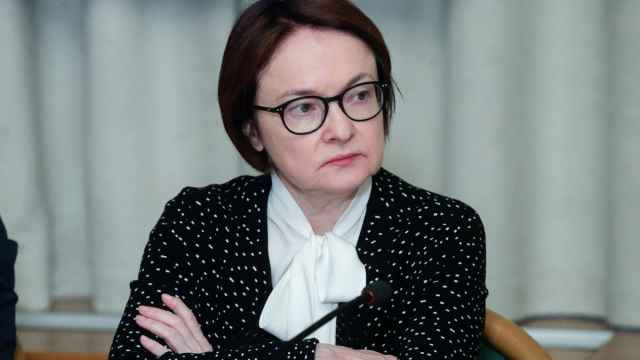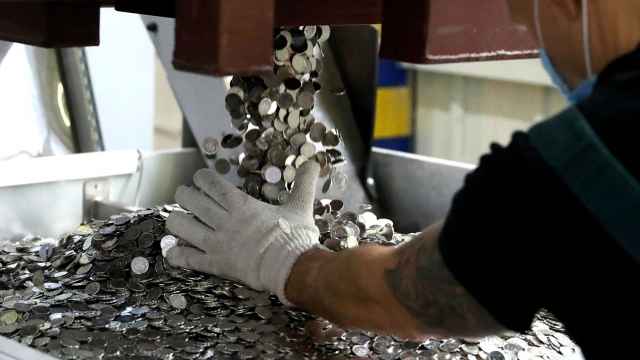Russia’s economy faces being plunged into a fresh economic crisis following Moscow’s move to start military action in Ukraine.
The Russian ruble fell 10% to its lowest ever level against the U.S. dollar and euro Thursday morning within minutes of Russian President Vladimir Putin’s announcement of a “special operation.”
Tough economic sanctions from the West are certain to follow, with leaders in the U.S. and Europe staging emergency meetings Thursday to decide how to respond to what Joe Biden has called Moscow’s “flagrant aggression.”
Despite months of tensions and a significant troop buildup by Russian forces, the prospect of full-scale war was being largely dismissed in Moscow until earlier this week when Putin delivered an angry address to the nation undermining Ukraine’s sovereignty and peddling unjustified claims about a “genocide” in Ukraine.
Moscow claims its economy is well protected from any Western sanctions and the economic fallout that will follow.
“It will be painful, but we’ve got through it before,” an economics correspondent said in a news update on state TV on Wednesday, after the first tranche of sanctions were put in place.
The Russian government says it has built up significant government reserves — more than $630 billion — which it believes will protect the economy from the worst of any economic crisis.
The government runs an annual surplus — meaning it does not need to borrow cash on either the domestic or international markets — and government debt is below 20% of the country’s GDP.
Russia has also boasted about the success of its import substitution drive since it annexed Crimea in 2014, pointing mainly to the development of its agricultural industry thanks to a ban on food imports from the EU.
State-owned Sberbank, by far the country’s largest and most important financial institution, issued a bullish statement on Thursday morning, claiming it was “ready for any development of the situation” and had “worked through scenarios to guarantee the protection of our resources, assets and customer interests.”
This balance sheet — dubbed “fortress Russia” — is regularly pointed to as a source of protection.
But analysts are not convinced it would be enough in the face of a likely unprecedented Western response, pointing to both damaging short-term and long-term consequences.
“Given the severity of the Russian actions, we expect Western policymakers to go beyond their worst-case scenario plans, which puts Russia’s expulsion from the SWIFT financial messaging system in play. The Nord Stream 2 pipeline will be sidelined indefinitely,” said Eurasia Group’s Henry Rome.
Cut off from global economy
Several large state-owned banks are likely to be sanctioned, effectively cutting them off from the global economy. Washington and Brussels have also previously highlighted the possibility of blocking technology exports to Russia — a move that would inflict serious damage on the country’s state-owned and private businesses which remain heavily reliant on Western hardware and software to power their operations.
Despite Moscow’s high-profile de-dollarization drive in recent years — in anticipation of possible blocks on transacting in the currency — more than half of Russia’s exports are still priced in dollars, according to statistics cited by the Bank of Finland’s Institute for Economies in Transition (BOFIT). Another 30% are denominated in euros, as Russia’s economic partners — largely oil and gas buyers — have shunned the idea of switching to the Russian currency.
That leaves the Russian economy still heavily exposed to Western sanctions that target its ability to deal in the global economy.
At home, a crashing ruble will put even more pressure on an already struggling economy. Inflation is running at its highest level in six years of 8.7% and household finances are in a worse shape than a decade ago. A recent survey by a state-owned pollster found almost two-thirds of Russian families said they have no savings.
The ruble’s devaluation will only accentuate the living standards crisis — pushing prices up, possibly dramatically. According to one study, imported goods account for some 75% of the products and ingredients that go into making everyday products and food that are sold in Russia.
That dynamic will force the Central Bank into a familiar dilemma — bringing down inflation while not tanking the wider economy. Analysts expect it will prioritize the former, as in 2014, when the Russian economy faced a hard economic crisis following the annexation of Crimea and crash in global oil prices.
The regulator intervened Thursday morning to try to prop up the flagging currency and boost liquidity in the banking sector.
Interest rates
Interest rates are currently running at 9.5% and were already expected to rise to 11% or higher in the coming weeks. Higher borrowing costs will inevitably hurt Russian businesses and consumers, many of which are heavily indebted following a decade of economic stagnation.
Scope Ratings’ analyst Levon Kameryan said the escalation of the conflict could also result in capital flight, as Russians seek to protect their savings and assets from the looming economic crisis.
The key unknown in terms of the scope of an economic hit is energy flows, Kameryan added. Almost two-thirds of Russia’s natural gas exports flow to Europe and around half of its global oil sales — huge sources of revenue that have bankrolled Moscow’s “fortress Russia” sanctions-proofing in recent years.
Germany said Wednesday it had enough energy in storage to get through the winter should Russian flows be disrupted. There is little talk for now of Europe deciding to stop buying Russian energy, but there are fears Russia could turn off the taps or try to squeeze Europe in response to any sanctions package — especially as Putin has repeatedly shown that the domestic economy comes second to foreign policy in terms of priorities.
Russia’s energy exports to Europe are worth 90 billion euros a year, Scope Ratings calculated. Whether or not Russia moves to disrupt flows — and incur the loss of revenues — the latest action will only lead to an intensification of Europe's long-term move to reduce its reliance on Russian oil and gas, analysts said.
A Message from The Moscow Times:
Dear readers,
We are facing unprecedented challenges. Russia's Prosecutor General's Office has designated The Moscow Times as an "undesirable" organization, criminalizing our work and putting our staff at risk of prosecution. This follows our earlier unjust labeling as a "foreign agent."
These actions are direct attempts to silence independent journalism in Russia. The authorities claim our work "discredits the decisions of the Russian leadership." We see things differently: we strive to provide accurate, unbiased reporting on Russia.
We, the journalists of The Moscow Times, refuse to be silenced. But to continue our work, we need your help.
Your support, no matter how small, makes a world of difference. If you can, please support us monthly starting from just $2. It's quick to set up, and every contribution makes a significant impact.
By supporting The Moscow Times, you're defending open, independent journalism in the face of repression. Thank you for standing with us.
Remind me later.



